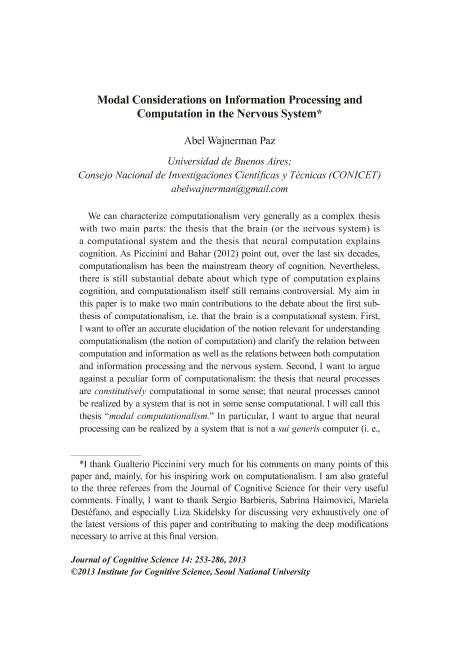Mostrar el registro sencillo del ítem
dc.contributor.author
Wajnerman Paz, Abel

dc.date.available
2017-11-13T20:11:06Z
dc.date.issued
2013-09
dc.identifier.citation
Wajnerman Paz, Abel; Modal Considerations on Information Processing and Computation in the Nervous System; Seoul National University. Institute for Cognitive Science; Journal of Cognitive Science; 14; 3; 9-2013; 253-286
dc.identifier.issn
1598-2327
dc.identifier.uri
http://hdl.handle.net/11336/28091
dc.description.abstract
We can characterize computationalism very generally as a complex thesis with two main parts: the thesis that the brain (or the nervous system) is a computational system and the thesis that neural computation explains cognition. As Piccinini and Bahar (2012) point out, over the last six decades, computationalism has been the mainstream theory of cognition. Nevertheless, there is still substantial debate about which type of computation explains cognition, and computationalism itself still remains controversial. My aim in this paper is to make two main contributions to the debate about the first subthesis of computationalism, i.e. that the brain is a computational system. First, I want to offer an accurate elucidation of the notion relevant for understanding computationalism (the notion of computation) and clarify the relation between computation and information as well as the relations between both computation and information processing and the nervous system. Second, I want to argue against a peculiar form of computationalism: the thesis that neural processes are constitutively computational in some sense; that neural processes cannot be realized by a system that is not in some sense computational. I will call this thesis "modal computationalism". In particular, I want to argue that neural processing can be realized by a system that is not a sui generis computer (i. e., a computing system that is neither digital nor analog) and by a system that is not a generic computer (a computer in the most general sense: one that includes digital, analog, and any other kind of computation). Actual neural processing is presumed to be computational in these two senses (Piccinini and Bahar 2012). I will argue that, even if this is true, neural processing can be realized by a computing system that is not of the same kind as those that perform actual neural processing and even by a system that is not computational at all.
dc.format
application/pdf
dc.language.iso
eng
dc.publisher
Seoul National University. Institute for Cognitive Science
dc.rights
info:eu-repo/semantics/openAccess
dc.rights.uri
https://creativecommons.org/licenses/by-nc-sa/2.5/ar/
dc.subject
Computationalism
dc.subject
Semantic Information
dc.subject
Cognition
dc.subject
Feedback Control
dc.subject
Neural Computation
dc.subject
Generic Computation
dc.subject.classification
Estudios Religiosos

dc.subject.classification
Filosofía, Ética y Religión

dc.subject.classification
HUMANIDADES

dc.title
Modal Considerations on Information Processing and Computation in the Nervous System
dc.type
info:eu-repo/semantics/article
dc.type
info:ar-repo/semantics/artículo
dc.type
info:eu-repo/semantics/publishedVersion
dc.date.updated
2017-11-13T11:32:52Z
dc.journal.volume
14
dc.journal.number
3
dc.journal.pagination
253-286
dc.journal.pais
Corea del Sur

dc.journal.ciudad
Seúl
dc.description.fil
Fil: Wajnerman Paz, Abel. Consejo Nacional de Investigaciones Científicas y Técnicas; Argentina. Universidad de Buenos Aires; Argentina
dc.journal.title
Journal of Cognitive Science
dc.relation.alternativeid
info:eu-repo/semantics/altIdentifier/url/http://cogsci.snu.ac.kr/jcs/index.php/issues/?pageid=6&mod=document&uid=152
Archivos asociados
